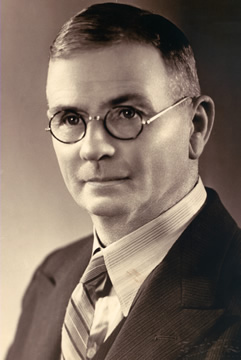UPPILL, Oliver (1876–1946)
Senator for South Australia, 1935–44 (United Australia Party)
Uppill took up farming at Balaklava and on 17 August 1904 married Gertrude Caroline Murray, at the church of St Mary of Bethany, Goyder. He was a member and secretary (c. 1908-10) of the Balaklava branch of the Agricultural Bureau. He was also a member, then vice-president, and from 1919 to 1920 president, of the Balaklava and Dalkey Agricultural Society. After World War I he became active in politics at the state level. From 1920 to 1923, he served as president of the Liberal Union, and from 1923 to 1924 of its successor, the Liberal Federation. He was a producers’ representative on the board of the State Bank of South Australia in the Depression years between 1928 and 1934 and was assistant director (1932–34) of the Farmers’ Debts Adjustment Department.[i]
Uppill was elected to the Senate as a United Australia Party representative in September 1934 and re-elected in September 1940. As well as being a member of the Committee of Disputed Returns and Qualifications and of the House Committee, he was a natural selection for the Joint Committee on Rural Industries formed in 1941. Alongside his South Australian Senate colleagues, he was a member of the National Service Group, a faction within the UAP led by R. G. Menzies and formed in 1943. He was Opposition Whip from 1943 to 1944.
An earnest rather than engaging speaker, Uppill spoke infrequently. According to his friend Senator James McLachlan, ‘Nature did not equip him as a “word-spinner”, but it gave to him a keen analytical mind, a firm determination, and the courage to stand for his opinions, whether or not they were popular’. One of his first speeches was a spirited defence of South Australia’s administration of the War Service Homes Bill, and he spoke occasionally on other issues. In 1938 he gave, at best, lukewarm support to the National Health and Pensions Insurance Bill and opposed the 40-hour week. In September 1942 he expressed concern over the Curtin Government’s handling of war finance. He was particularly worried that greater personal spending power was leading to increasing drunkenness and immorality. On the subject of reducing the alcoholic strength of beer, he made the suggestion that the authorities ‘do the same as was done to the digger’s soup—when there was not sufficient to go around the cook put another bucket of water in it’.[ii]
Although mindful of what he called South Australia’s ‘disabilities under federation’, Uppill was a strong supporter of the Australian federal system. He countered its critics by quoting the English legal authority, Lord Bryce: ‘As an expression of true Federal Powers . . . [Australia’s Constitution] stands on a higher plane for skilful draftsmanship and necessary powers than even the American Constitution’. Uppill opposed the Labor Government’s Constitution Alteration (Post-war Reconstruction and Democratic Rights) Bill 1944, announcing that it was an ‘attempt to hoodwink the public with a sentimental camouflage which, if granted, will enable the Labour party to control, in peace, every phase of the lives of our people’. He was adamant that the ‘States, with their respective “on-the-spot” administrators, are far more capable of judiciously interpreting the wishes of the people than those bureaucrats situated some thousands of miles away in Canberra’.[iii]
Generally, however, Uppill kept to the subject he knew best—wheat. He saw assistance for primary producers as a natural corollary of arbitration and tariff protection, though he conceded that ‘there are inefficient men in primary as well as in secondary industries, and . . . that this country cannot carry them on indefinitely’. In 1938 he co-authored with Senator Wilson a price equalisation scheme for wheat (and expressed his satisfaction when the principle was adopted as a wartime measure in late 1940). He became increasingly frustrated by the effect upon wheat farmers of wartime controls introduced by the Labor Government, urging, in 1944, a return to unrestricted production based on a guaranteed price. Manpower and equipment shortages, he believed, would allay the threat of overproduction.[iv]
On 16 September 1944 Uppill resigned on account of ill health. Survived by his wife, son George and daughter Ethel, he died on 28 February 1946 at St Anthony’s Private Hospital, Joslin, South Australia, and was buried in the North Road Cemetery. The camera captured a man whose appearance was clerical rather than robustly rural. Bespectacled and modest, his purpose was, nevertheless, tenacious and rock solid. For his parliamentary identity it is difficult to deny the accuracy of the description Uppill chose to provide in Who’s Who: ‘elected Senator for S.A. gen. election 1934, re-elected 1940; interested in rural problems, particularly wheat’.[v]
[i] Rex Penna, Fertile Valley to Open Plain: The Nantawarra and Beaufort Districts, Peacock Publications, Frewville, SA, 1982, p. 61; Advertiser (Adel.), 17 Sept. 1934, p. 18, 2 Mar. 1946, p. 10.
[ii] A. W. Martin, Robert Menzies: A Life, vol. 1, MUP, Carlton, Vic., 1993, p. 408; CPD, 20 Sept. 1944, p. 1052, 13 Mar. 1946, p. 169, 4 Dec. 1935, pp. 2433-6, 23 June 1938, pp. 2564-6, 12 Oct. 1938, p. 587, 24 Sept. 1942, pp. 815–17.
[iii] CPD, 9 Oct. 1936, pp. 990-2, 21 Mar. 1944, pp. 1631–2.
[iv] CPD, 5 & 6 Dec. 1935, pp. 2655-6, 30 Apr. 1936, pp. 1017-19, 1 Dec. 1938, pp. 2490-2; K. C. Wilson and O. Uppill, A Wheat Equalization Scheme, Commercial Printing House, Adelaide, 1938; CPD, 11 Dec. 1940, pp. 897-9, 901, 31 Mar. 1944, pp. 2521–2.
[v] Advertiser (Adel.), 2 Mar. 1946, p. 10; CPD, 20 Sept. 1944, p. 1052, 6 Mar. 1946, p. 5, 13 Mar. 1946, pp. 168–9; Who’s Who in Australia, 1941, p. 659.
This biography was first published in The Biographical Dictionary of the Australian Senate, vol. 2, 1929-1962, Melbourne University Press, Carlton, Vic., 2004, pp. 286-288.


